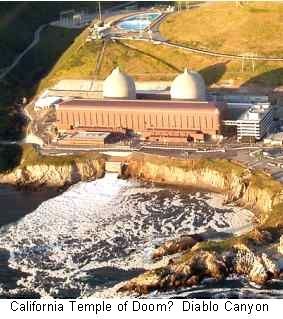Pages: << 1 ... 935 936 937 938 939 940 941 942 943 944 945 ... 1278 >>
Libyan Options Running Out
By Brian Downing

The Libyan uprising once seemed sure to follow the pattern in Tunisia and Egypt where longstanding autocrats stepped down after large popular demonstrations. Colonel Kadafi, however, has rallied his forces and is quashing the opposition. This has put policymakers in the region and around the world in a dilemma between their preference for democracy and their reluctance to intervene. There are a few actions that can be embarked upon, but which is optimal and who if anyone will take the lead? (Image)
Winds chase evacuees in Japan; Hawaii threatened by Fukushima fallout
By Rady Ananda

In a deepening tragedy, after an earthquake and tsunami caused four explosions at nuclear reactor plants in Japan, most of those who evacuated the area headed south, since winds normally would have pushed the radioactive clouds to the north and east. Instead, winds pushed the r-clouds south, according to The Australian. The shift in winds now threatens Hawaii with fallout from the Fukushima nuclear facilities.
Officials finally admit radiation has reached lethal levels in the area surrounding the explosions. Tokyo, 200 miles to the south, is also seeing higher levels of radiation. “[A]bnormal radiation and traces of radioactive elements were detected around Greater Tokyo, the world's most populous metropolitan region with 36 million people."
The paper also noted that "Hong Kong, The Philippines, Singapore and South Korea began testing Japanese food imports for radiation yesterday.”
Though initial mainstream news sources downplayed the danger, mocking the following map which has gone viral, it now seems wise for North Americans on the West Coast to consider relocating, at least temporarily. Radioactive winds are expected to hit North America tonight.
"Postponed, but Not Avoided" (OpEdNews 404 – Repost)
By Robert Singer
 Click here to read why “this article is not currently available” at OpEdNews.
Click here to read why “this article is not currently available” at OpEdNews.
October 21, 2008
Postponed, but Not Avoided
On both environmental and financial fronts, the end of our consumer society can be postponed, but not avoided.
We live, after all, in a society that is consumed with unrelenting consumption.
Even the most conscientious consumers are leaving us in a world in which the air and water are polluted, the world’s precious rainforests are depleted and the planet continues its downward spiral into the grip of global warming.
Agrarian economies, even economies ruled under the limited excesses of Communism, are consumption oriented. With hungry capitalistic societies thrown into the mix, it’s estimated that the most of the world’s resources will be gone before the year 2023. The outlook isn’t bright.
Post Nuclear Japan, Pre Disaster United States

The Japanese disaster at Fukushima I is a human tragedy of striking proportions. As many as ten thousand citizens may be dead in the general catastrophe, with many more at risk for radiation poisoning at levels yet to be determined. The fact that Japan is a highly organized and wealthy nation in no way diminishes the intensity of the losses and pain experienced by the victims. (Image)
Political and economic implications will emerge rapidly. As the whole world watches, the Japanese experience creates windows of opportunity to learn how to avert future meltdowns at nuclear ticking time bombs placed throughout Europe, the United States, India, and China.
Events have overwhelmed the highly professional Japanese bureaucracy. In a late Saturday night report by CNN, the chief cabinet minister said that he presumed that there was a nuclear meltdown in reactors one and two, with three on the way. A nuclear regulatory official hedged by referring to the "possibility" of a meltdown, which he said could not be confirmed since workers couldn't get close enough to see. The same regulatory official told CNN,
The Tragedy of Fukushima May Be Mankind’s Greatest Hope
Peter Chamberlin
The Tragedy of Fukushima is not yet fully known, at least not in terms of the long-term effects of the radiation released today and tomorrow, perhaps for mankind’s entire “half-lifetime.” We don’t know (meaning our best scientists don’t know) what will grow out of the hole which has been blasted in our collective consciences today. Our knowledge of atomic science, just like our understanding of all earth science, is in its infancy, yet we have chosen to build nuclear reactors in geologically risky locations. Beyond the risky siting problems, lie the earth forces of wind and water, which we only now beginning to see.
The End of Nuclear and its Timing
by Jan Lundberg

Three days before the Fukushima nuclear power explosion, I made this comment on a peace activist's Facebook page: "I believe a successful, final anti-nuke campaign will only take place in one of two ways: (1) collapse puts the entire infrastructure of industry and consumption out of business, forcing the survivors to minimally babysit the nukes forever, or, there's an accident or deliberate blast or meltdown that motivates people all over the world to shut down the mechanical beast once and for all."
I didn't think it would come so soon. But that has been the pattern for our planet in peril in recent years: acceleration of disasters, climate destabilization, peak oil, strife such as wars and revolutions, extremes of elitist wealth and overwhelming poverty, fresh water depletion -- all prelude to complete collapse. However, to use the equivalent of jiu-jitsu or aikido to rapidly channel the onslaught of negative energy toward something positive is our duty and opportunity. It takes not only a mass awakening to the insane futility of nuclear power, but a realization that the present system; a.k.a. Western Civilization, is hitting bottom. As glorifying as our civilization is in some respects, the extinction of species and the sprawling, cancerous waste known as development (for profit of the few) are impossible to ignore and excuse.
Manning Must be Tortured to Make an Example of Him and to Intimidate his Supporters
Kevin Zeese
Stand With Brad, We Are All Bradley Manning
WikiLeaks threatens corporate media control over information, the government’s need to mislead to the public
The article below is from a speech given by Kevin Zeese in support of Bradley Manning at Bus Boys and Poets in Washington, DC on March 13, 2011.
His cell is six feet wide and twelve feet in length.
It has a bed, a drinking fountain, and a toilet.
At 5:00 a.m. he is woken up. He will not be allowed to sleep again until 8:00 p.m. If he attempts to sleep at any time from 5 AM to 8 PM he will be made to sit up or stand by the guards.
WTO Sides With Chinese State Capitalism Against the U.S.
Ian Fletcher

The World Trade Organization has a long history of anti-American actions. They’ve just handed us another one, and in the process handed a big freebie to Chinese state capitalism.
Unbeknownst to most Americans, huge sections of our nation’s trade policy aren’t set in this country anymore. They are set by panels of WTO judges in Switzerland, to whom we have signed over the right to rule on the legitimacy of our policies.
At issue in a WTO ruling handed down last Friday is how much scope the U.S. is entitled to in trying to level the playing field for American companies competing against companies subsidized under China’s system of state capitalism.
The Morphing of Obama
By William T. Hathaway

"They have healed the brokenness of my people superficially, saying, 'Peace, peace.' But there is no peace." - Jeremiah 8:11
When the prophet Jeremiah wrote those words, he could have been describing the public-relations strategy of the current US government. Barack Obama won the presidency and the hearts of billions around the world by pledging to bring peace. His humanitarian rhetoric promised a new era in American foreign policy, away from armed confrontation and towards cooperation. But since taking office he has increased combat forces in Afghanistan, expanded our air strikes in Pakistan, shifted the fighting in Iraq onto hired mercenaries and local soldiers, and pledged his "full support" to the "heroic" CIA. Obama doesn't want to end the war, he wants to fight it smarter, cutting our losses in some areas while stepping up attacks in others, aiming to salvage a partial victory. The new commander in chief has scaled down the grandiose goals that launched the war, replacing them with a fallback battle plan for maintaining some control over the Iraqi and Afghan governments, oil supplies, and pipeline routes.
CONGRESSMAN PETER KING’S GREAT MUSLIM SCARE
Franklin Lamb

Peter King
Half a century ago, during the late Senator Joseph McCarthy fueled “great red’ scare” that terrorized many in America, my kindergarten teacher at Milwaukie Grammar School in Oregon, Miss Kidd, used to instruct our class of five and six year olds how to prepare for the coming Atomic bomb attack from the communists in the Soviet Union, who she explained, “did not like our freedom and wanted to kill all Americans.”
As I recall, the twice weekly A-bomb practice sessions were actually sort of fun. Complete with squealing and sometimes trembling, pants wetting or crying classmates dropping to the floor as Miss Kidd, right in the middle of reading us a nice story like “Life on the Prairie”, from her chair in front of the class, would pause, remove her glasses, look toward the windows, slap shut the storybook on her lap, and shout “down!”
<< 1 ... 935 936 937 938 939 940 941 942 943 944 945 ... 1278 >>





